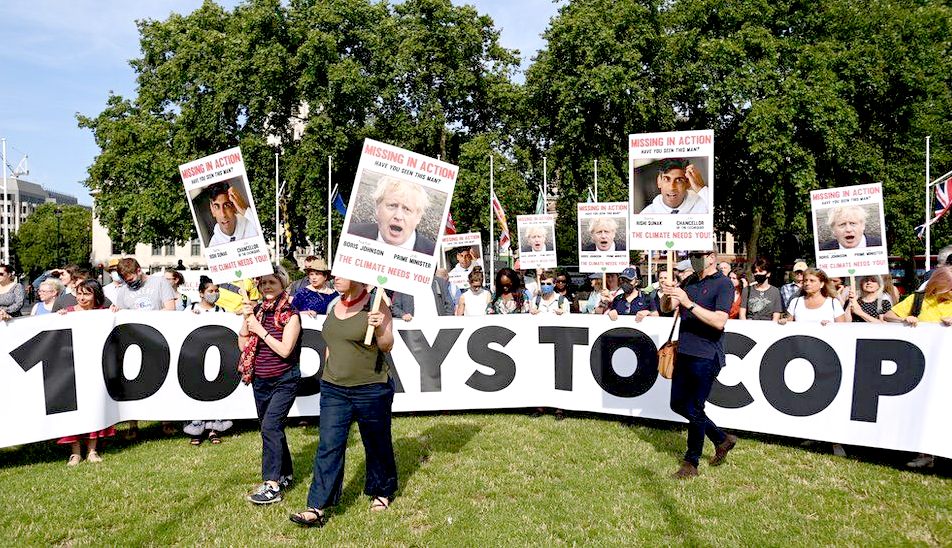
CLIMATE
CRIMINALS - We
pay our taxes but get no value for all our hard earned pounds. Our income is taxed along with just about everything we
buy in staged policies designed to milk the electorate dry.
The
British love a good comedy act - the proof of which is electing a clown from Eton to run the country,
still resident at Clowning
Street. The Joker, in Batman, could not have done worse. The
Government's handling of Covid 19 is just one example of how unprepared
we are for any emergencies, following an election win based on Brexit
bravado. Afghanistan is another Blair style catastrophe, and now climate
change is looking to burn Britain's in their own homes, interspersed
with floods. With food shortages to come. At least we have diesel and
petrol being phased out for transport.
In
a world where global warming dictates
we must shrink our economies, no surprises
that Boris the Johnson, is promoting a building boom in Sussex with
defective policies, that allow corrupt councils to keep on building,
raising the carbon footprint of what was a "green
and pleasant land." Wow, he's somewhat
behind the curve and absent without leave, or missing in action. The new
hallmark of British politics, under the Government Her Majesty Queen
Elizabeth appointed to run the country. COP 26 is looming and our Climate Change Act
2008 non-targets, will never deliver the cooling the planet urgently
needs to protect our way of life, because councils are still acting as
if there is nothing wrong with warming the planet a little more, taking
us to the brink - for more Community Infrastructure Levies and higher
rate-able values.
Let's
face it, that is all they know. Councils have very low intellectual
capacities. All they know is how to screw the electorate in Gestapo
fashion, taking their lead from (typically) corrupt planning officers
and executives. Who work with other agencies, hand in glove, to quash
all attempts at individuals to raise awareness, with SLAPP
actions.
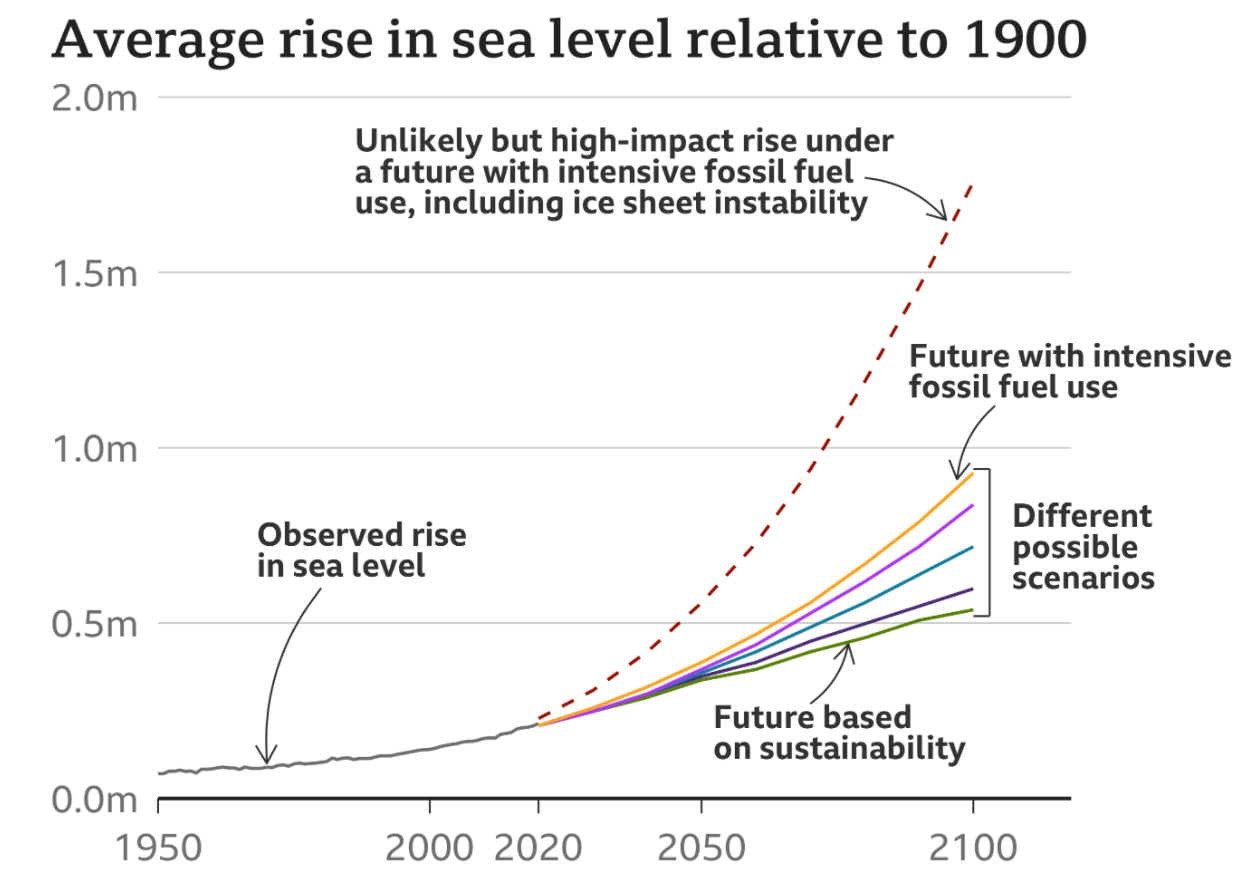
COASTLINES
WILL SUFFER - Predicted sea level rise with various scenarios. We're
looking at 250mm rise or more by 2050.
Human-induced climate
change is already affecting many weather and
climate extremes in every region across the globe. Scientists are also
observing changes across the whole of Earth’s climate system; in the
atmosphere, in the oceans, ice floes, and on land.
Many of these changes are unprecedented, and some of the shifts are in
motion now, while some - such as continued sea level rise – are
already ‘irreversible’ for centuries to millennia, ahead, the report
warns.
But there is still time to limit climate
change, IPCC experts say. Strong and sustained reductions in
emissions of carbon dioxide (CO2) and other greenhouse gases, could
quickly make air quality better, and in 20 to 30 years global
temperatures could stabilize.
‘Code red for humanity’
The UN
Secretary-General António Guterres said the
Working Group's report was nothing less than "a code red for
humanity. The alarm bells are deafening, and the evidence is
irrefutable".
He noted that the internationally-agreed threshold of 1.5 degrees above
pre-industrial levels of global heating was "perilously close. We
are at imminent risk of hitting 1.5 degrees in the near term. The only
way to prevent exceeding this threshold, is by urgently stepping up our
efforts, and pursuing the most ambitious path.
"We must act decisively now, to keep 1.5 alive."
The UN chief in a detailed reaction to the report, said that solutions
were clear. "Inclusive and green economies, prosperity, cleaner air
and better health are possible for all, if we respond to this crisis
with solidarity and courage", he said.
He added that ahead of the crucial COP26 climate
conference in Glasgow in November, all nations - especially the advanced G20 economies
- needed to join the net zero emissions coalition, and reinforce their
promises on slowing down and reversing global heating, "with
credible, concrete, and enhanced Nationally Determined Contributions (NDCs)"
that lay out detailed steps.
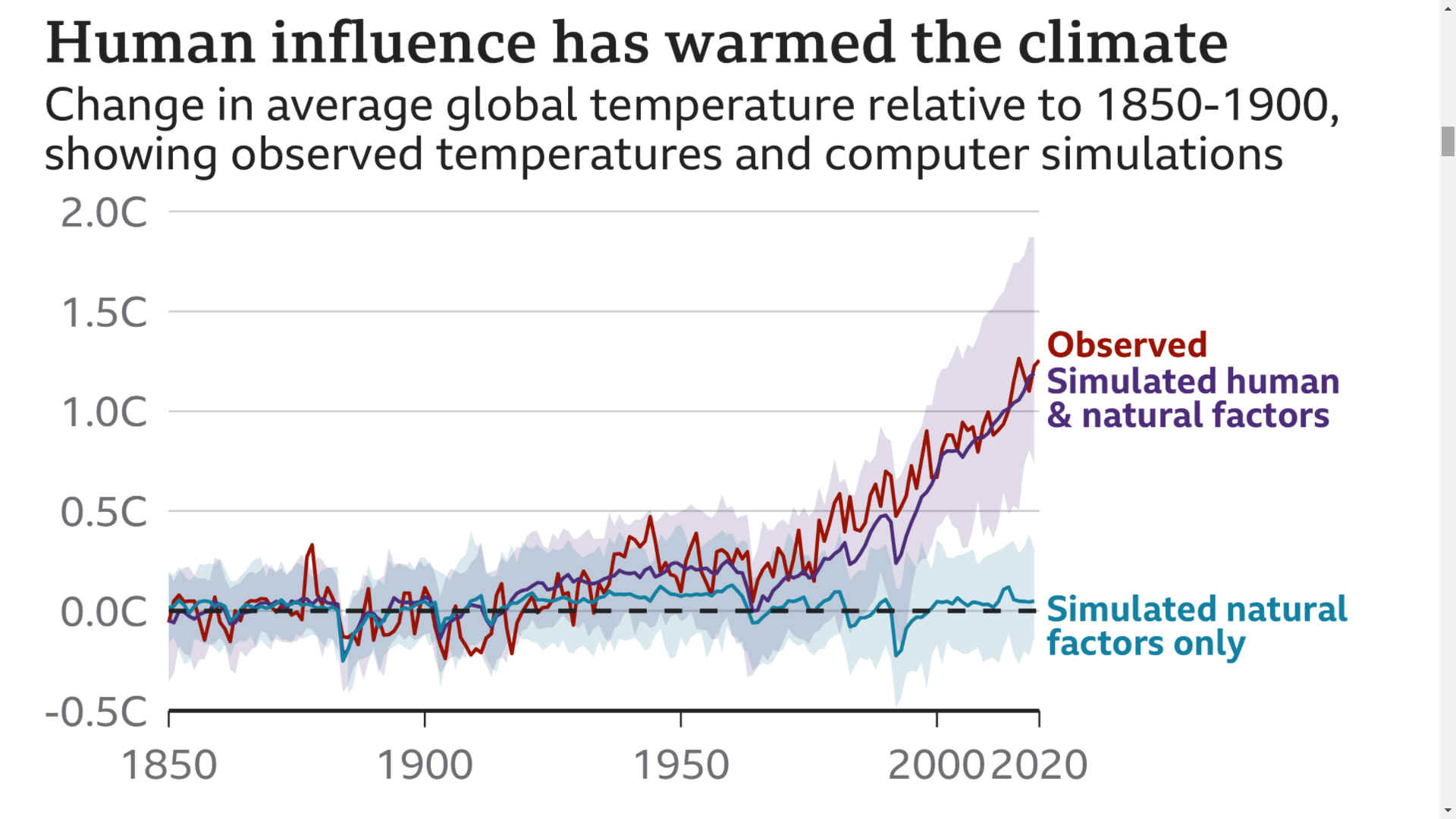
Human handiwork
The report, prepared by 234 scientists from 66 countries, highlights
that human influence has warmed the climate at a rate that is
unprecedented in at least the last 2,000 years.
In 2019, atmospheric CO2 concentrations were higher than at any time in
at least 2 million years, and concentrations of methane and nitrous
oxide were higher than at any time in the last 800,000 years.
Global surface temperature has increased faster since 1970 than in any
other 50-year period over a least the last 2,000 years. For example,
temperatures during the most recent decade (2011–2020) exceed those of
the most recent multi-century warm period, around 6,500 years ago, the
report indicates.
Meanwhile, global mean sea level has risen faster since 1900, than over
any preceding century in at least the last 3,000 years.
The document shows that emissions of greenhouse
gases from human activities are responsible for
approximately 1.1°C of warming between 1850-1900, and finds that
averaged over the next 20 years, global temperature is expected to reach
or exceed 1.5°C of heating.
The IPCC scientists warn global warming of 2°C will be exceeded during
the 21st century. Unless rapid and deep reductions in CO2 and other
greenhouse gas emissions occur in the coming decades, achieving the
goals of the 2015 Paris Agreement “will be beyond reach”.
The assessment is based on improved data on historical warming, as well
as progress in scientific understanding of the response of the climate
system to human-caused emissions.
“It has been clear for decades that the Earth’s climate is changing,
and the role of human influence on the climate system is undisputed,”
said IPCC Working Group I Co-Chair, Valérie Masson-Delmotte. “Yet the
new report also reflects major advances in the science of attribution
– understanding the role of climate
change in intensifying specific weather and
climate events”.
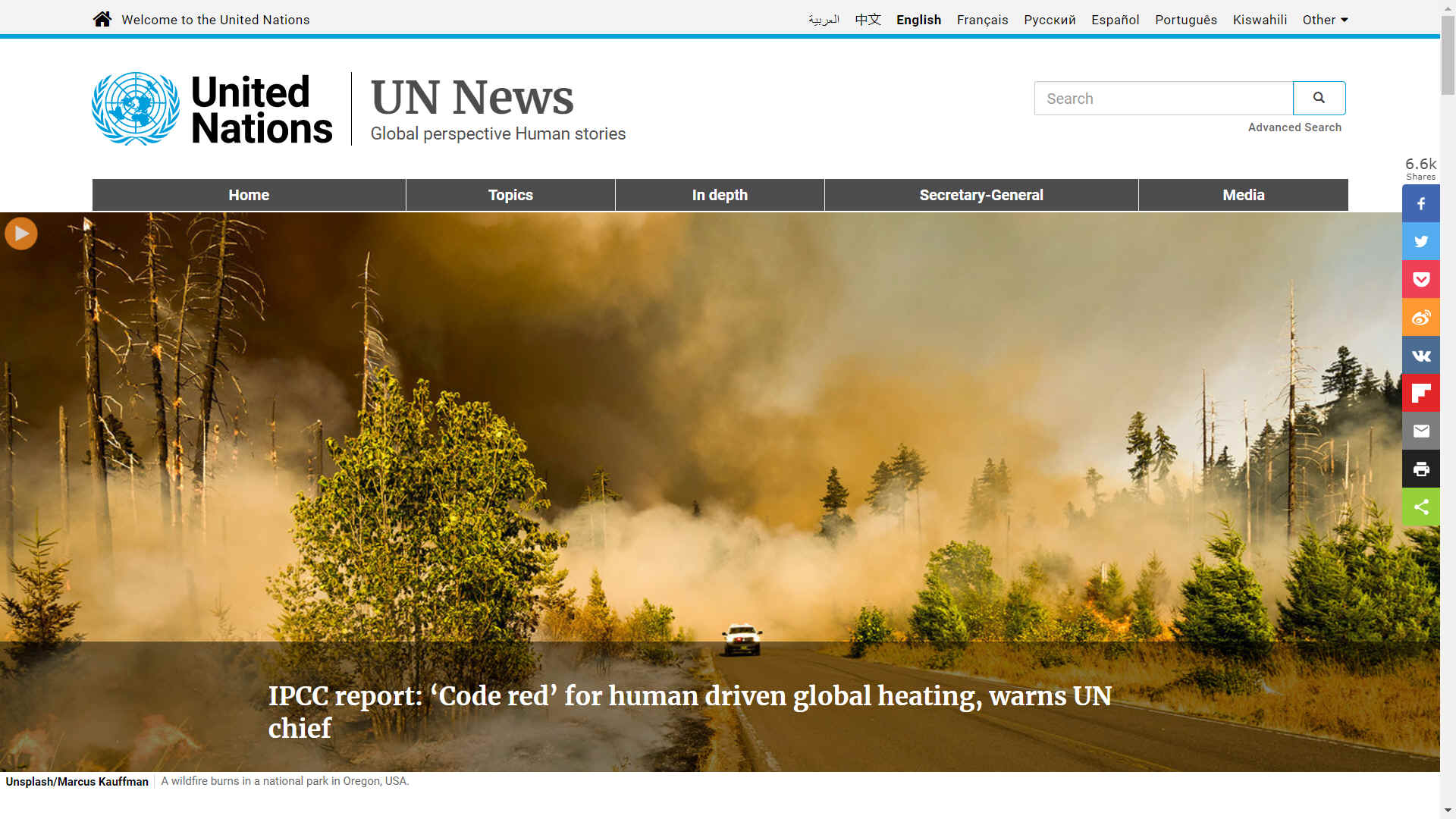
Extreme changes
The experts reveal that human activities affect all major climate system
components, with some responding over decades and others over centuries.
Scientists also point out that evidence of observed changes in extremes
such as heatwaves, heavy precipitation, droughts, and tropical cyclones,
and their attribution to human influence, has strengthened.
They add that many changes in the climate system become larger in direct
relation to increasing global warming.
This includes increases in the frequency and intensity of heat extremes,
marine heatwaves, and heavy precipitation; agricultural and ecological
droughts in some regions; the proportion of intense tropical cyclones;
as well as reductions in Arctic sea ice, snow cover and permafrost.
The report makes clear that while natural drivers will modulate
human-caused changes, especially at regional levels and in the near
term, they will have little effect on long-term global warming.
The IPCC experts project that in the coming decades climate changes will
increase in all regions. For 1.5°C of global warming, there will be
increasing heat waves, longer warm seasons and shorter cold seasons.
At 2°C of global warming, heat extremes are more likely to reach
critical tolerance thresholds for agriculture and health.
But it won’t be just about temperature. For example, climate change is
intensifying the natural production of water – the water cycle. This
brings more intense rainfall and associated flooding, as well as more
intense drought in many regions.
It is also affecting rainfall patterns. In high latitudes, precipitation
is likely to increase, while it is projected to decrease over large
parts of the subtropics. Changes to monsoon rain patterns are expected,
which will vary by region, the report warns.
Moreover, coastal areas will see continued sea level rise throughout the
21st century, contributing to more frequent and severe coastal flooding
in low-lying areas and coastal erosion.
Extreme sea level events that previously occurred once in 100 years
could happen every year by the end of this century.
The report also indicates that further warming will amplify permafrost
thawing, and the loss of seasonal snow cover, melting of glaciers and
ice sheets, and loss of summer Arctic sea ice.
Changes to the ocean, including warming, more frequent marine heatwaves,
ocean acidification, and reduced oxygen levels, affect both ocean
ecosystems and the people that rely on them, and they will continue
throughout at least the rest of this century.
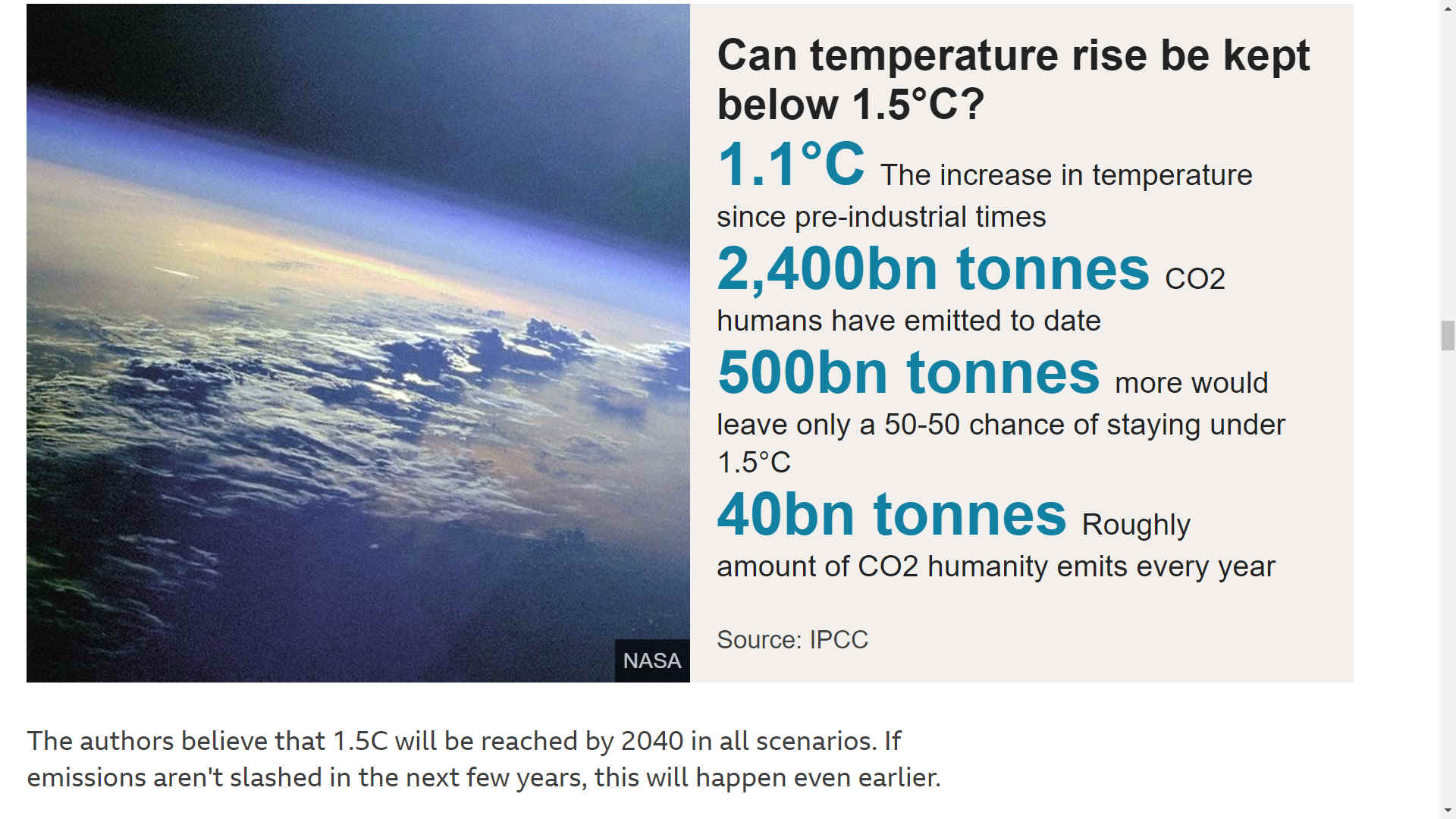
Magnified in cities
Experts warn that for cities, some aspects of climate change may be
magnified, including heat, flooding from heavy precipitation events and
sea level rise in coastal cities.
Furthermore, IPCC scientists caution that low-likelihood outcomes, such
as ice sheet collapse or abrupt ocean circulation changes, cannot be
ruled out.
Limiting climate change
“Stabilizing the climate will require strong, rapid, and sustained
reductions in greenhouse gas emissions, and reaching net zero CO2
emissions. Limiting other greenhouse gases and air pollutants,
especially methane, could have benefits both for health and the
climate,” highlights IPCC Working Group I Co-Chair Panmao Zhai.
The report explains that from a physical science perspective, limiting
human-induced global warming to a specific level requires limiting
cumulative carbon
dioxide emissions, reaching at least net zero CO2
emissions, along with strong reductions in other greenhouse gas
emissions.
“Strong, rapid and sustained reductions in methane emissions would
also limit the warming effect resulting from declining aerosol
pollution”, IPCC scientists underscore.
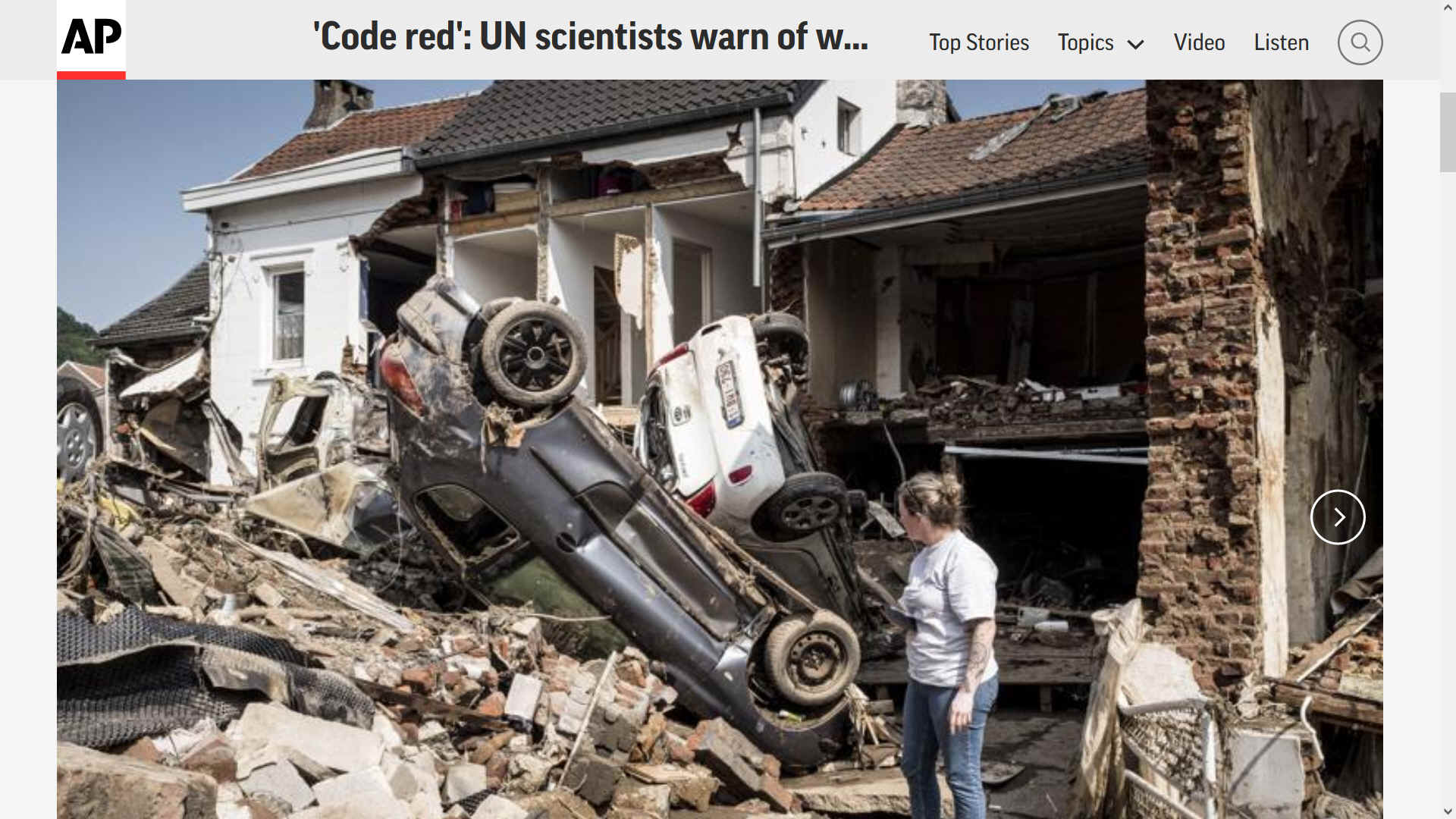
About the IPCC
The Intergovernmental Panel on Climate Change (IPCC) is the UN body
for assessing the science related to climate change. It was established
by the United Nations Environment Programme (UNEP) and the World
Meteorological Organization (WMO) in 1988 to provide political leaders
with periodic scientific assessments concerning climate change, its
implications and risks, as well as to put forward adaptation and
mitigation strategies.
In the same year the UN General Assembly endorsed the action by the WMO
and UNEP in jointly establishing the IPCC.
It has 195 member states.
Thousands of people from all over the world contribute to the work of
the IPCC. For the assessment reports, IPCC scientists volunteer their
time to assess the thousands of scientific papers published each year to
provide a comprehensive summary of what is known about the drivers of
climate change, its impacts and future risks, and how adaptation and
mitigation can reduce those risks.
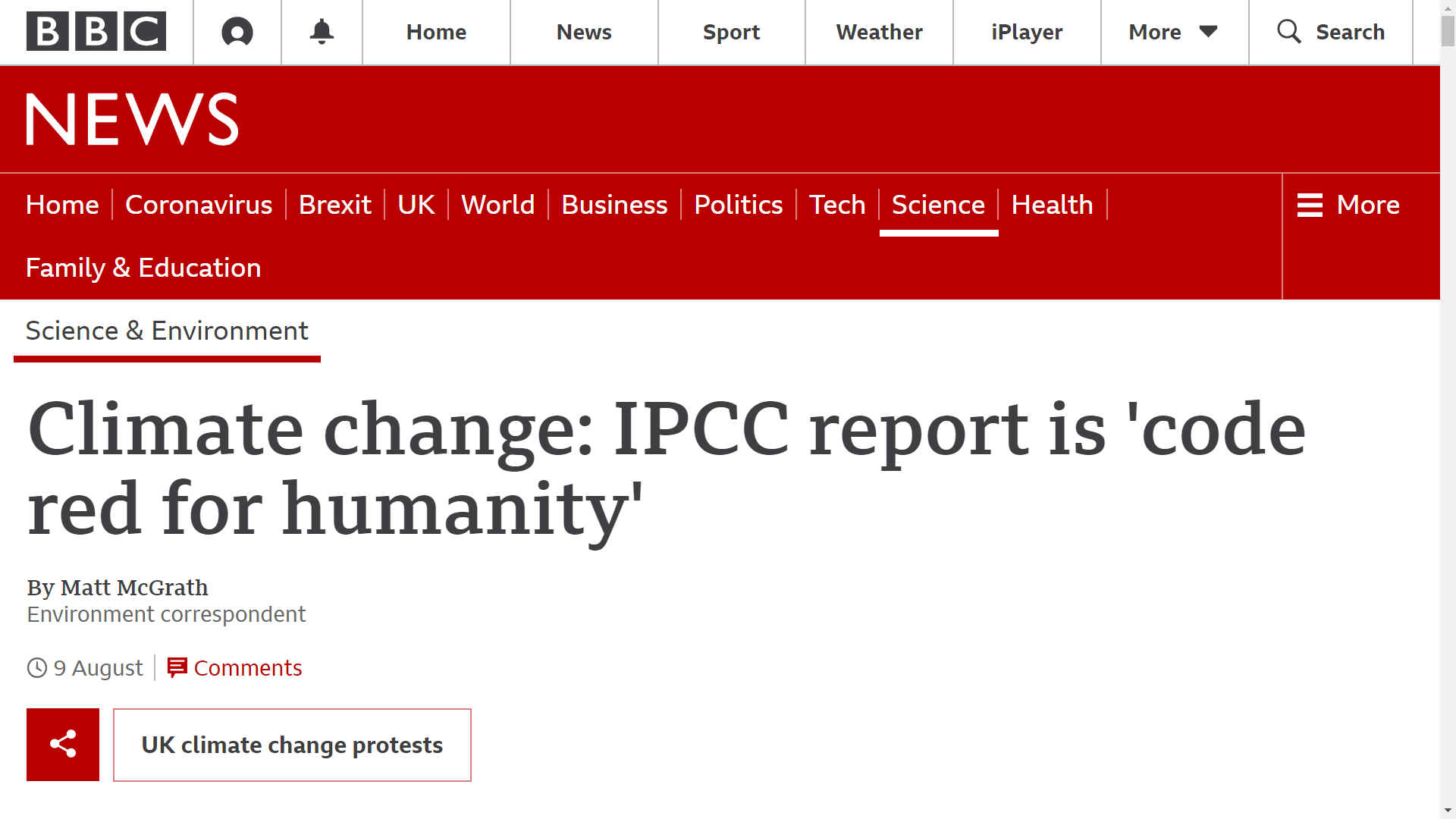
'Before our very eyes'
Multiple, recent climate disasters including devastating flooding in
central China and western Europe have focused public attention as never
before, suggested Inger Andersen, Executive Director of the UN
Environment Programme (UNEP).
“As citizens and as businesses and as governments, we are well aware
of the drama,” she said “The drama exists, we have seen it and we
heard about it in every news bulletin. And that’s what we need to
understand, that the expression of what the science says is exhibited
before our very eyes, and of course what this excellent report does is,
it projects those scenarios outward, and tells us, if we do not take
action, what could be the potential outcomes, or if we do take action,
what will be a very good outcome.”
Climate adaption critical
Apart from the urgent need for climate mitigation, "it is essential
to pay attention to climate adaptation", said the WMO chief, Peteri
Taalas, "since the negative trend in climate will continue for
decades and in some cases for thousands of years.
"One powerful way to adapt is to invest in early warning, climate
and water services", he said."Only half of the 193 members of
WMO have such services in place, which means more human and economic
losses. We have also severe gaps in weather and hydrological observing
networks in Africa, some parts of Latin America and in Pacific and
Caribbean island states, which has a major negative impact on the
accuracy of weather forecasts in those areas, but also worldwide.
"The message of the IPCC report is crystal clear: we have to raise
the ambition level of mitigation."

BRITAIN
GOT A BUM DEAL - You could be forgiven for thinking this was
the new coat of arms for the British Parliament, the cast of which
government appears totally inept in many departments.
THE
CIRCUS - MARCH 2020 - PINKY & PERKY
|

Boris
Johnson
Prime
Minister
|

Rishi
Sunack
Chancellor
Exchequer
|

Priti
Patel
Home
Secretary
|

Dominic
Raab
Foreign
Secretary
|

Michael
Gove
Chancellor
D. Lancaster
|

Ben
Wallace
Defence
Secretary
|
|

Matt
Hancock
Health
& Social Care
|

Liz
Truss
International
Trade
|

Gavin
Williamson
Education
|

Oliver
Dowden
Culture
|

Alok
Sharma
MP
Reading West
|

Robert
Jenrick
Housing,
Local Gov.
|
|

Therese
Coffey
Work
& Pensions
|

Robert
Buckland
Justice
|

Anne-Marie
Trevelyan
International
Dev.
|

Grant
Shapps
Transport
|

George
Eustice
Environment
|

Brandon
Lewis
Northern
Ireland
|
|

Alister
Jack
Scottish
Sec. State
|

Simon
Hart
Welsh
Sec. State
|

Baroness
Evans
Leader
Lords
|

Amanda
Milling
Party
Chairman
|

Jacob
Rees-Mogg
Leader
Commons
|

Mark
Spencer
Chief
Whip
|
|
|

Suella
Braverman
Attorney
General
|
|

Stephen
Barclay
Treasury
Sec.
|
|
|
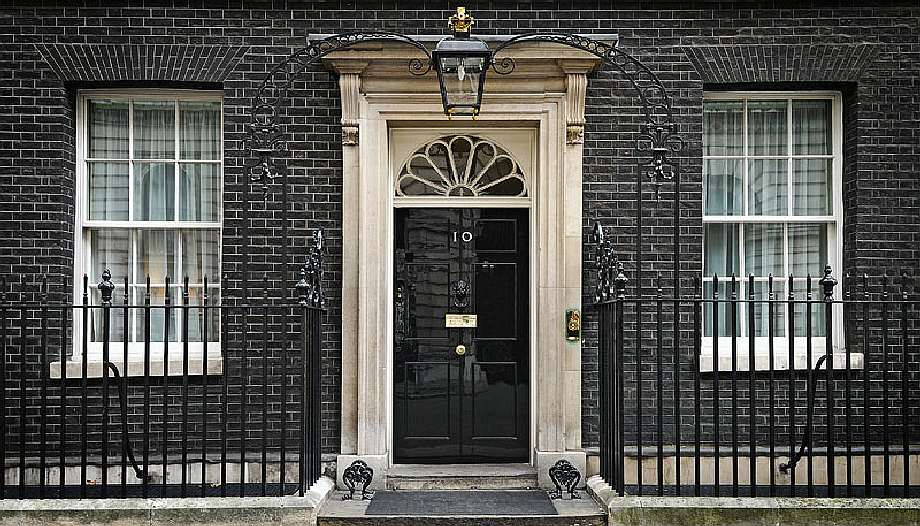
Conservative
politics is based on delaying economic shortcomings by robbing Peter to
pay Paul. Under Cameron,
May
and now BoJo, they are turning our villages into housing estates,
without the proper highways infrastructure. See Suicide
Junction, as a prime example of planning
madness, where the proposed new climate unfriendly housing estate
overburdens an A road, that has the capacity of a B road, just to raise
some CIL
payments and more rates, to make up for a council that has invested in
oil shares.
LINKS
& REFERENCE
https://




































